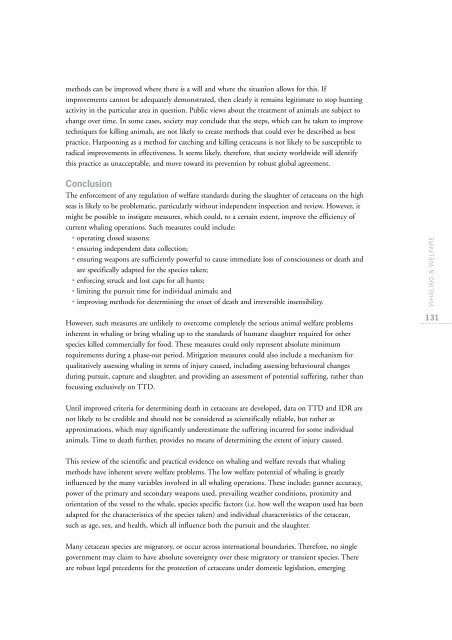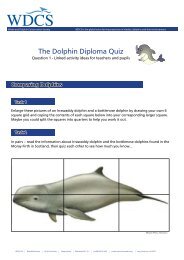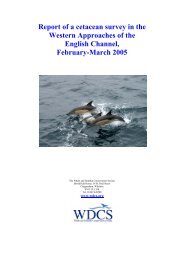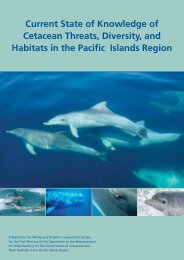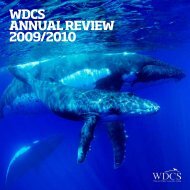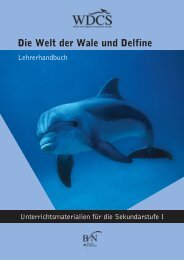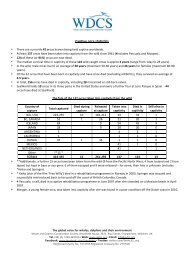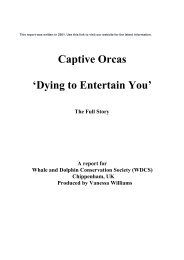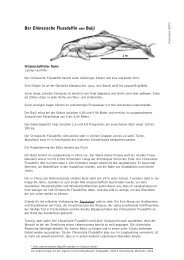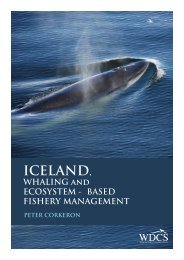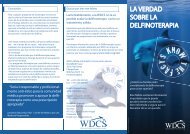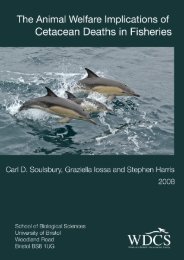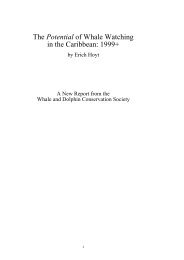TROUBLED WATERS - Whale and Dolphin Conservation Society
TROUBLED WATERS - Whale and Dolphin Conservation Society
TROUBLED WATERS - Whale and Dolphin Conservation Society
Create successful ePaper yourself
Turn your PDF publications into a flip-book with our unique Google optimized e-Paper software.
methods can be improved where there is a will <strong>and</strong> where the situation allows for this. If<br />
improvements cannot be adequately demonstrated, then clearly it remains legitimate to stop hunting<br />
activity in the particular area in question. Public views about the treatment of animals are subject to<br />
change over time. In some cases, society may conclude that the steps, which can be taken to improve<br />
techniques for killing animals, are not likely to create methods that could ever be described as best<br />
practice. Harpooning as a method for catching <strong>and</strong> killing cetaceans is not likely to be susceptible to<br />
radical improvements in effectiveness. It seems likely, therefore, that society worldwide will identify<br />
this practice as unacceptable, <strong>and</strong> move toward its prevention by robust global agreement.<br />
Conclusion<br />
The enforcement of any regulation of welfare st<strong>and</strong>ards during the slaughter of cetaceans on the high<br />
seas is likely to be problematic, particularly without independent inspection <strong>and</strong> review. However, it<br />
might be possible to instigate measures, which could, to a certain extent, improve the efficiency of<br />
current whaling operations. Such measures could include:<br />
• operating closed seasons;<br />
• ensuring independent data collection;<br />
• ensuring weapons are sufficiently powerful to cause immediate loss of consciousness or death <strong>and</strong><br />
are specifically adapted for the species taken;<br />
• enforcing struck <strong>and</strong> lost caps for all hunts;<br />
• limiting the pursuit time for individual animals; <strong>and</strong><br />
• improving methods for determining the onset of death <strong>and</strong> irreversible insensibility.<br />
However, such measures are unlikely to overcome completely the serious animal welfare problems<br />
inherent in whaling or bring whaling up to the st<strong>and</strong>ards of humane slaughter required for other<br />
species killed commercially for food. These measures could only represent absolute minimum<br />
requirements during a phase-out period. Mitigation measures could also include a mechanism for<br />
qualitatively assessing whaling in terms of injury caused, including assessing behavioural changes<br />
during pursuit, capture <strong>and</strong> slaughter, <strong>and</strong> providing an assessment of potential suffering, rather than<br />
focussing exclusively on TTD.<br />
Until improved criteria for determining death in cetaceans are developed, data on TTD <strong>and</strong> IDR are<br />
not likely to be credible <strong>and</strong> should not be considered as scientifically reliable, but rather as<br />
approximations, which may significantly underestimate the suffering incurred for some individual<br />
animals. Time to death further, provides no means of determining the extent of injury caused.<br />
This review of the scientific <strong>and</strong> practical evidence on whaling <strong>and</strong> welfare reveals that whaling<br />
methods have inherent severe welfare problems. The low welfare potential of whaling is greatly<br />
influenced by the many variables involved in all whaling operations. These include; gunner accuracy,<br />
power of the primary <strong>and</strong> secondary weapons used, prevailing weather conditions, proximity <strong>and</strong><br />
orientation of the vessel to the whale, species specific factors (i.e. how well the weapon used has been<br />
adapted for the characteristics of the species taken) <strong>and</strong> individual characteristics of the cetacean,<br />
such as age, sex, <strong>and</strong> health, which all influence both the pursuit <strong>and</strong> the slaughter.<br />
Many cetacean species are migratory, or occur across international boundaries. Therefore, no single<br />
government may claim to have absolute sovereignty over these migratory or transient species. There<br />
are robust legal precedents for the protection of cetaceans under domestic legislation, emerging<br />
WHALING & WELFARE<br />
131


